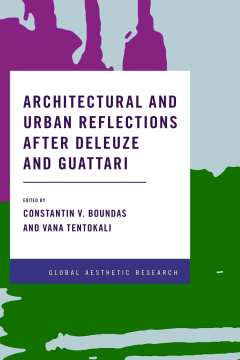
BOOK
Architectural and Urban Reflections after Deleuze and Guattari
Constantin V. Boundas | Vana Tentokali
(2017)
Additional Information
Book Details
Abstract
The post humanist movement which currently traverses various disciplines in the arts and humanities, as well as the role that the thought of Deleuze and Guattari has had in the course of this movement, has given rise to new practices in architecture and urban theory. This interdisciplinary volume brings together architects, urban designers and planners, and asks them to reflect and report on the (built) place and the city to come in the wake of Deleuze and Guattari.
This book dares to pose the question of what kind of architecture can realize the virtual plane of Ideas of Deleuze and Guattari’s philosophy. This because in spite of many years of theorizing about Deleuze and Guattari’s possible view of the role of architecture in their philosophy, there still has been no satisfactory answer to this question. The difficulty of this question and the complexity and diversity of the answers in this volume are due to the possibility or impossibility in the contemporary era of a nomadic architecture constituted as an immanent plane of trajectories, a swarm of intensities, the unlivable site of the body without organs, the differentiating principle of the fold, the unleashing of sensation, the perceptible realization of imperceptible forces, a map that deterritorializes, or an instrument of the propagation of light. This accomplished assemblage of architects, urban planners, and philosophers urge us to consider how the ideas of Deleuze and Guattari both organize and derange their architectural visions as they ceaselessly experiment with the very idea of the worlds architecture might be capable of creating.
Dorothea E. Olkowski, Professor of Philosophy, University of Colorado
Philosophy and architecture have been close neighbors for some time; although the relationship was traditionally understood as the latter borrowing concepts from the former. This unique and timely volume establishes a more bi-directional relationship between practitioners and theorists, who are brought together to analyze the questions and problems of a process that is posed by the Deleuzo-Guattarian image of thought.
Gregg Lambert, Dean’s Professor of Humanities at Syracuse University
Vana Tentokali is a Dr Architect and Professor Emeritus in the Department of Architecture at the Aristotle University of Thessaloniki. Vana has held a number of positions, including being a member of the teaching faculty in the Department of Architecture at Roger Williams College (Bristol Rhode Island U.S.A., 1986); a Research Fellow at the Behavioral Science Research Group in Architecture (Department of Architecture) and the Program for Gender Studies (Department of Humanities) at MIT Cambridge Massachusetts, U.S.A. (1982-1985); a Visiting Scholar for the Program of History, Theory and Criticism (Department of Architecture MIT, spring semester 1992), and a Visiting Research Fellow for the Program in Hellenic Studies, (Princeton University, U.S.A., fall term 2008).
Constantin V. Boundas (Trent University, Ontario) holds M.A. Ph.D. from Purdue, and he is Professor Emeritus of Philosophy and a member of the Centre for the Study of Theory, History and Culture at Trent University. He is the editor of The Deleuze Reader (New York: Columbia University Press, 1993); with Dorothea Olkowski, of The Theater of Philosophy: Critical Essays on Gilles Deleuze (New York: Routledge, 1994); and of Deleuze and Philosophy (Edinburgh: Edinburgh University Press, 2006); the General Editor of The Companion to the Twentieth Century Philosophies, jointly published by Edinburgh and Columbia University Presses in 2007; and of Deleuze: The Intensive Reduction (London and New York: Continuum, 2009).
The challenging and provocative chapters of this timely collection open multiple pathways for exploiting the thought of Deleuze and Guattari in the development of a theory and practice of nomadic architecture within a reconceptualized urban space. An essential contribution to contemporary discourse on the interface of philosophy, politics and the built environment.
Ronald Bogue, Professor Emeritus of Comparative Literature, University of Georgia
Table of Contents
| Section Title | Page | Action | Price |
|---|---|---|---|
| Architectural and Urban Reflections after Deleuze and Guattari | Cover | ||
| Contents | vii | ||
| Introduction | 1 | ||
| Part I: Architecture and Urbanism: Arts of the Built Space | 27 | ||
| 1 Schizoanalytic City | 29 | ||
| 2 Deleuze, Space and the Architectural Fragment | 45 | ||
| 3 Architectural Translations of Deleuze and Guattari’s Thought on the Concept of Place | 61 | ||
| 4 The Skin of the Public Space | 73 | ||
| 5 Bodies without Organs and Cities without Architecture | 83 | ||
| Part II: Architectural and Urbanist Toolkits | 103 | ||
| 6 Gilles Deleuze and Chaos Theory | 105 | ||
| 7 A Thousand Models of Realisation: Towards a Deleuzoguattarian Critical Urban Theory | 123 | ||
| 8 Non-Correlational Athens | 139 | ||
| 9 Architecture at the Age of Its Digital Production: The Force, Differentiation and Humanity of the Fold as an Architectural Principle | 153 | ||
| 10 Design of Earth Movement: Objects, Buildings and Environment Conceived as Landscape Formations | 163 | ||
| 11 Spatial Transcriptions of the Concept of the Fold in Architecture as a Landscape-Sensitive Approach | 179 | ||
| Part III: Vital Materiality | 189 | ||
| 12 Laocoon and the Snakes of History | 191 | ||
| 13 Reterritorialising Concrete as an Actor of Comfort in Architecture | 209 | ||
| 14 Radicalising Architecture by Redefining the Monument | 221 | ||
| 15 Diagrammatic Narratives: Graphic Fields of Rupture and Catastrophe | 243 | ||
| 16 The Concept of Map in the Homeric Odyssey | 251 | ||
| Part IV: The Clinical | 265 | ||
| 17 From the Exhaustion of the Dogmatic Image of Thought that Circumscribes Architecture to Feminist Practices of Joy | 267 | ||
| Selected Bibliography | 283 | ||
| Index | 297 | ||
| About the Editors and Contributors | 301 |
